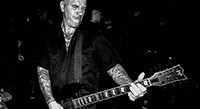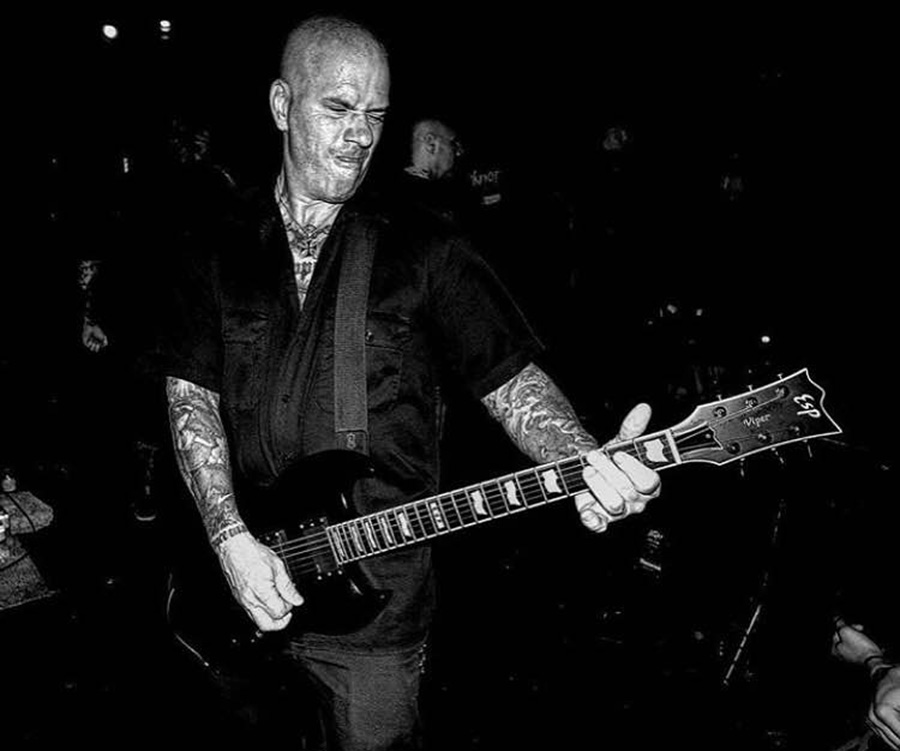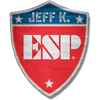Artist Spotlight: Craig Silverman (Agnostic Front)
Artist Spotlight: Craig Silverman (Agnostic Front)


Agnostic Front is one of the most influential American hardcore punk bands. Having formed in 1980, the band has been lauded as pioneers of the crossover thrash genre, adding thrash metal elements to their classic punk rock sound. ESP player Craig Silverman, who’d played in a number of well-known and respected hardcore bands such as Only Living Witness, Blood For Blood, and Ramallah (and is still a member of Slapshot) had been a long-term fan of Agnostic Front when, in 2014, he got a call to audition for the band.
What was your first experience playing ESP?
The first time I played one was about 12 years ago. A buddy of mine had a couple of ESPs, and I thought they played great, though I didn’t go out and buy one at the time.
What got you into being an ESP player, then?
So many of my friends were playing ESP guitars. In the last seven or eight years, I realized that most of my friends were playing ESP. I figured I should check them out deeper, so I actually bought an LTD Viper-1000. I immediately fell in love with them. Right away, I preferred the Viper over the guitar I’d been playing previously.
Eventually I contacted (ESP sales administrator) Justin Evans, and I wound up talking to Chris (Cannella, ESP artist relations manager). The relationship started, and now here we are.
What’s in your guitar collection now?
I have three LTD Viper-1000s, and an ESP Viper. I also have two Eclipses with the EverTune bridge.
What do you like about the Viper?
It’s the perfect guitar. First, it’s light, but it’s also so full sounding. The neck is the most comfortable I’ve ever played. I’ve been playing for 36 years, and I’ve never played a better guitar. They look great, they sound great. End of story.
What kind of pickups are in your Vipers?
EMG 81.
We guess you like an aggressive, in-your-face sound.
Yup.
In a band like Agnostic Front, you’re on the road a lot. Is reliability a big factor in choosing a guitar?
Absolutely. I’m not tied to my guitars. I play them. They get beat up, they get chipped, they take a beating, and they still sound great. That’s what matters to me. I play hard, and the guitars hold up well. The same cannot be said about other guitar brands.
Agnostic Front has been around over 35 years, and you joined them just a few years ago. What are the challenges of joining a band that’s so well established?
I’ve actually been a part of the hardcore scene since the mid-1980s. I’ve been in so many bands along the way. I’ve known these guys for decades. The thing about the scene, there were no idols. There were just people you kind of admired. I started going to shows when I was 13, and everyone else I hung out with was 17-18, or even 21. I looked up to them like older brothers.
So, the first hardcore show I ever went to was Agnostic Front in 1984. To join AF, it’s huge. It would be like a rock guy joining Zeppelin or Deep Purple or Black Sabbath. It’s an absolute honor playing with one of the bands that really inspired me. I often say that if it wasn’t for them, I wouldn’t be paying with them.
What was your background previous to the band?
I’ve been in quite a few bands over the years. At the time I joined, I was in a band called Ramallah. Things were really starting to pick up, but then there were complications, and our plans got sidelined. When I got the call to join Agnostic Front, it just so happened that the Ramallah thing wasn’t working out.
It was just perfect timing and luck. I’d still been close to the AF guys. My buddy Ian McFarland directed their Live at CBGB DVD for them. So my tour had been postponed, and Ian called me to say that AF is looking for a guitar player and he'd recommended me. I didn’t think anything of it. But 20 seconds later, Roger called me.
Did you have to audition? Were you already familiar with the material?
It wasn’t even a situation of awkwardness or anything. He just said, “We have 30 players coming down to audition.” I did have to learn a couple songs. Mike Gallo gave me the set list, and I just learned it.
So, truthfully, it’s about being in the right place at the right time. That’s all it is. Most of it is networking, and then being there and being available.
Most players are familiar with the challenge that musicians go through, when they’ve become proficient on their instrument but then hit a plateau where they don’t seem to be improving any further. Any advice for them?
Yeah. Don’t just stick to one kind of music. I’ve always loved rock, and metal, and country, and hardcore. Hardcore punk, there’s so much about it that I could talk for hours.
Here’s an example. I love Greg Ginn’s guitar playing. I love his style as much as I love Yngwie Malmsteen’s. Greg Ginn, technically, is proficient, but he plays nothing like Yngwie. And Yngwie Malmsteen could not play like Greg Ginn. You don’t have to be technically a great guitar player to play what’s right for a particular style.
I like David Gilmour for what he does. I like a guy like Tony MacAlpine. I like Ritchie Blackmore. But I also like Pig Champion of Poison Idea for what he did, and Bubba Dupree from Void. It’s all in their unique approach. They bring what they do to the table, and play like themselves.





